Beauveria Bassiana Market Research, 2032
The global beauveria bassiana market was valued at $89.2 million in 2022, and is projected to reach $195.1 million by 2032, growing at a CAGR of 8.4% from 2023 to 2032. Increase in demand for organic pest control solutions in agriculture, driven by concerns over chemical residues and environmental sustainability, has boosted the growth of the beauveria bassiana market.
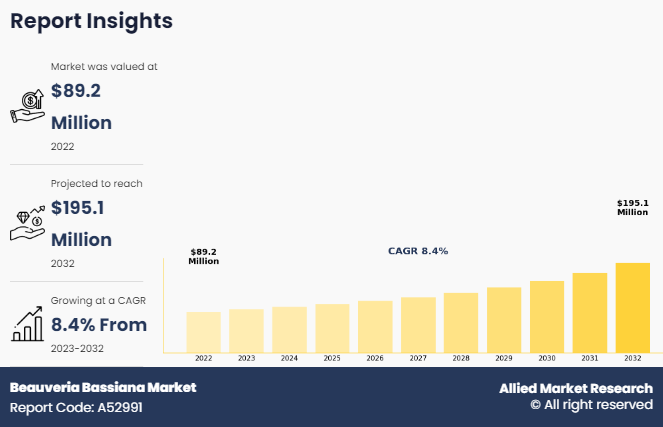
Beauveria bassiana is a type of fungus utilized for its biocontrol properties against insect pests. It is cultivated on various substrates, such as grains or agricultural by-products, under controlled conditions. Once grown, it is typically formulated into biopesticides for application in pest-infested areas. The market has experienced growth owing to increase in demand for sustainable agricultural practices, growing awareness of the harmful effects of chemical pesticides, and stringent regulations promoting eco-friendly alternatives.
Key Takeaways
By type, the liquid segment was the highest revenue contributor to the market in 2022.
By application, the agriculture segment was the largest segment in the global beauveria bassiana market during the forecast period.
By distribution channel, the indirect sales segment was the highest revenue contributor to the market in 2022.
Region-wise, North America was the highest revenue contributor in 2022.
Market Dynamics
The shift toward non-chemical pest control methods has been a significant driver in surge in the market demand for beauveria bassiana pesticides. With rise in awareness of the detrimental effects of chemical pesticides on human health and the environment, there is a growing preference for safer and more sustainable alternatives, particularly in food crops and other harvested produce.
Beauveria bassiana is a natural and eco-friendly biopesticide, which perfectly aligns with the present requirement of the farmers for chemical-free pesticides. Its effectiveness in controlling a wide range of insect pests while posing minimal risk to non-target organisms and the environment makes it a highly desirable solution for modern agriculture.
Moreover, regulatory pressures and government initiatives aimed at reducing the use of chemical pesticides further fuel the demand for alternatives including biopesticides such as beauveria bassiana. With stricter regulations governing pesticide usage and increase in emphasis on sustainable agricultural practices, farmers are actively seeking safer and more environmentally friendly pest management solutions. Thus, rise in adoption of integrated pest management (IPM) strategies, which prioritize biological and non-chemical methods, creates a favorable environment for the expansion of the beauveria bassiana industry, driving its growth in the coming years.
However, competition from chemical pesticides poses a significant restraint on the demand for the beauveria bassiana market. Chemical pesticides have long been the dominant solution for pest control owing to their immediate and often potent effects. Farmers may opt for chemical pesticides out of habit or due to their affordability and reliability, despite the growing awareness of their harmful impacts on human health and the environment. The preference for chemical pesticides presents a barrier to the adoption of beauveria bassiana biopesticides, as farmers may be hesitant to switch to alternative solutions without clear evidence of comparable efficacy, thus having a negative impact on beauveria bassiana market share.
Furthermore, aggressive marketing tactics employed by chemical pesticide manufacturers can further hinder the beauveria bassiana market size. Large-scale advertising campaigns and established distribution networks enable chemical pesticide companies to maintain their market dominance and influence the purchasing decision of farmers. The challenge for beauveria bassiana suppliers lies in convincing farmers of the effectiveness and long-term benefits of biopesticides over chemical alternatives, despite initial resistance and skepticism fueled by the pervasive presence of chemical pesticides in the agricultural market.
The expansion of horticulture and floriculture industries presents significant opportunities for the beauveria bassiana market growth. These industries often rely heavily on pest control measures to protect high-value crops such as fruits, vegetables, and ornamental plants from damaging insects and diseases. As the demand for horticultural and floricultural products continues to rise globally, there is a growing need for effective and sustainable pest management solutions such as beauveria bassiana, which has helped boost the beauveria bassiana market demand.
For instance, in greenhouse production systems where horticultural crops are grown in controlled environments, the risk of pest infestations can be particularly high due to the favorable conditions for insect and fungal growth. Beauveria bassiana offers an eco-friendly solution to control pests such as aphids, thrips, and whiteflies without harming beneficial insects or pollinators. Moreover, as consumers increasingly prioritize environmentally friendly and chemical-free products, growers in the horticulture and floriculture industries are shifting toward biopesticides such as beauveria bassiana to meet market demands and comply with regulations.
Thus, expansion of horticulture and floriculture industries provides an ideal environment for the adoption of beauveria bassiana as a sustainable pest control solution, which is anticipated to drive growth and innovation in the beauveria bassiana market. As farmers seek to optimize crop yields while minimizing environmental impact, the demand for effective and safe alternatives to chemical pesticides is expected to grow rapidly, positioning beauveria bassiana as an essential product in global horticultural and floricultural markets.
Moreover, technological advancements in production processes of beuaveria bassiana have further created growth opportunities in the beauveria bassiana market. Innovations such as fermentation optimization, downstream processing improvements, and the development of novel formulation techniques have led to increased efficiency and scalability in beauveria bassiana production. These advancements have enabled manufacturers to produce high quantities of high-quality beauveria bassiana products at reduced costs, thereby making them more accessible to farmers. Moreover, advancements in encapsulation and delivery systems have enhanced the stability and shelf-life of beauveria bassiana formulations, ensuring their efficacy over longer periods and under various environmental conditions.
Furthermore, technological innovations have facilitated the customization of beauveria bassiana products to target specific pests or cater to diverse agricultural systems. This flexibility allows for tailored solutions to meet the unique pest management needs of different crops and regions, thereby expanding the potential market reach of beauveria bassiana. In addition, advancements in application technologies, such as precision spraying systems and aerial drone applications, have improved the efficiency and accuracy of beauveria bassiana , further enhancing its attractiveness to farmers seeking effective and sustainable pest control solutions. Thus, technological advancements continue to drive growth and innovation in the beauveria bassiana market, unlocking new opportunities for both manufacturers and end-users in the agricultural sector.
Segmental Overview
The beauveria bassiana market is segmented into type, application, distribution channel, and region. By type, the market is segregated into liquid, powder, and others. By application, it is segregated into agriculture, forestry, and others. Depending on distribution channel, it is categorized into indirect sales and direct sales. Region-wise, it is analyzed across North America (U.S., Canada, and Mexico), Europe (Germany, UK, France, Italy, Spain, and rest of Europe), Asia-Pacific (China, India, Japan, South Korea, Australia, ASEAN, and rest of Asia-Pacific), Latin America (Brazil, Colombia, Argentina, and rest of Latin America), and Middle East Africa (GCC, South Africa, and rest of MEA).
By Type
By type, the liquid segment dominated the global beauveria bassiana market in 2022 and is anticipated to continue the same trend during the forecast period owing to its ease of application and efficacy in pest control. Liquid formulations of beauveria bassiana offer versatility, allowing for various application methods such as foliar spraying, soil drenching, and seed treatment. The type of flexibility offered by liquid segment enables farmers to efficiently target pests at different stages of their life cycles and across diverse agricultural settings, ranging from field crops to greenhouse environments. Moreover, liquid formulations ensure uniform coverage and distribution of the biopesticide, maximizing its effectiveness in controlling pest populations while minimizing the risk of underapplication and uneven treatment.
In addition, availability of ready-to-use liquid formulations simplifies the application process for farmers, saving time and labor costs associated with mixing and preparing the biopesticide. Thus, these factors contribute to the dominance of the liquid segment in the global beauveria bassiana market during the beauveria bassiana market forecast, reflecting its widespread acceptance and preference among agricultural stakeholders seeking effective and convenient pest control solutions.
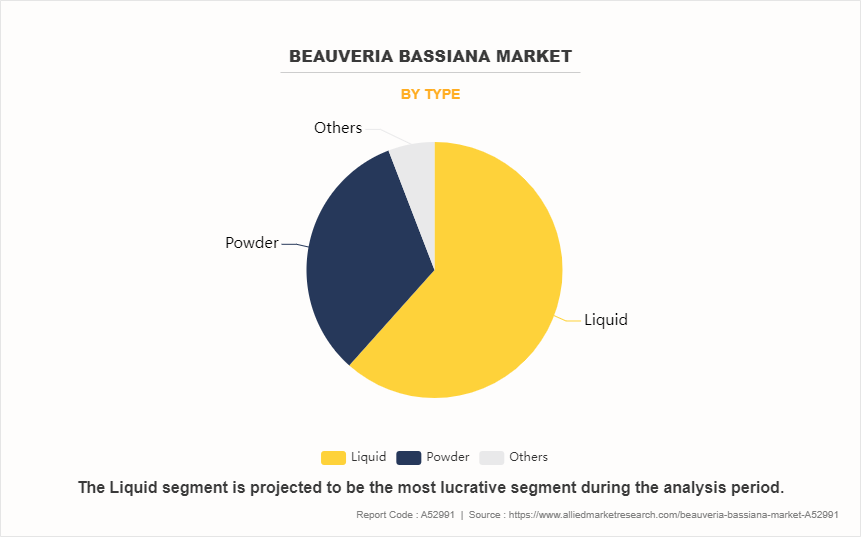
By Application
By application, the agriculture segment led the global beauveria bassiana market in 2022 and is anticipated to maintain its dominance during the forecast period. Agriculture represents the largest consumer base for biopesticides such as beauveria bassiana. As farmers increasingly seek sustainable and eco-friendly alternatives to chemical pesticides, there has been a rise in demand for biological control agents such as beauveria bassiana, which offer effective pest management while minimizing environmental impact. The shift in consumer preferences aligns with global trends toward sustainable agriculture practices, further driving the growth of the segment in beauveria bassiana segment.
Moreover, versatility of beauveria bassiana in targeting a wide range of agricultural pests has contributed to its dominance in the agriculture segment. This fungus is effective against various insect pests, including beetles, caterpillars, aphids, among others, which provides farmers with a comprehensive solution for pest control across different crops and regions. Furthermore, adoption of integrated pest management (IPM) practices within the agriculture sector has further boosted the demand for beauveria bassiana.
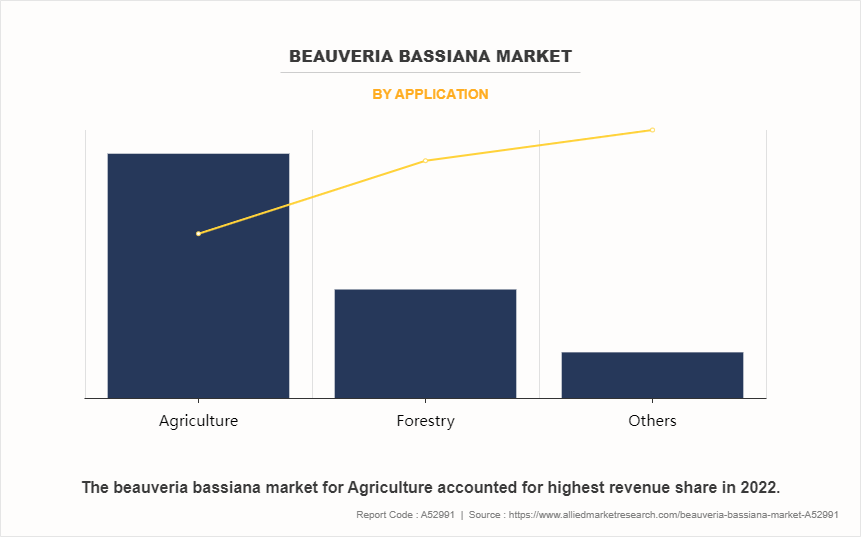
By Distribution Channel
By distribution channel, the indirect sales channel segment has registered the highest growth in 2022 and is anticipated to maintain its dominance during the forecast period.‐¯Indirect sales channels, including distributors and retailers often have well-established networks and extensive reach, which allows for wider market penetration and distribution of beauveria bassiana products to agricultural regions worldwide. These intermediaries play a crucial role in connecting manufacturers with end-users, especially in geographically diverse markets where direct sales may be challenging to execute efficiently.
In addition, indirect sales channel provides added value through services such as product promotion, technical support, and after-sales assistance, which are essential for educating farmers and ensuring proper usage of biopesticides such as beauveria bassiana. The support provided by them enhances customer satisfaction and builds trust, leading to increased adoption and repeat purchases.
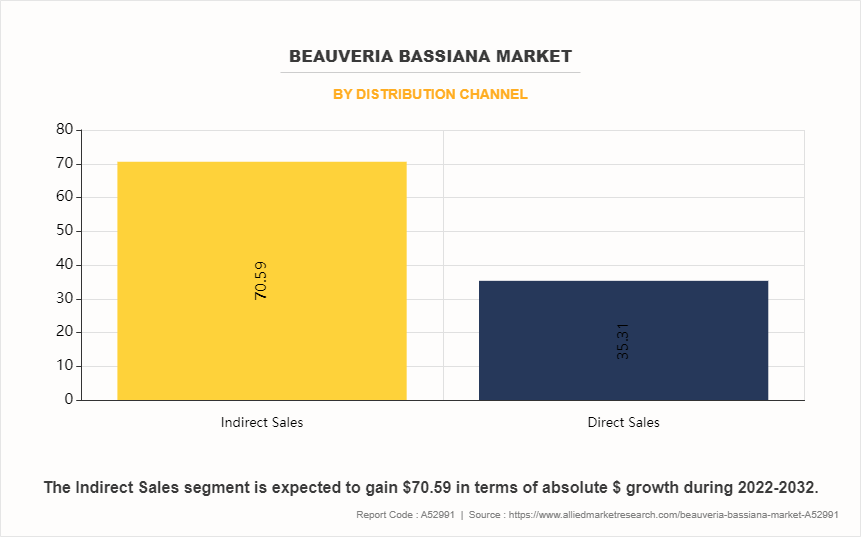
By Region
Region-wise, North America is anticipated to be the major shareholder during the forecast period. North America possesses a strong agricultural sector with high emphasis on sustainability and eco-friendly practices. As a result, there is growth in demand for biopesticides such as beauveria bassiana, which offer effective pest control while minimizing environmental impact. Extensive R&D efforts in the region have led to the development of advanced formulations and application techniques for beauveria bassiana products, enhancing their efficacy and appeal to farmers. Moreover, stringent regulations on chemical pesticide usage in North America have further incentivized the adoption of biopesticides, driving the market growth.
Moreover, the presence of key players and established distribution networks in North America has facilitated the widespread availability and adoption of beauveria bassiana products in the region. Thus, the favorable market environment, along with increase in awareness among farmers about the benefits of beauveria bassiana, has led to the growth of the North America beauveria bassiana market.
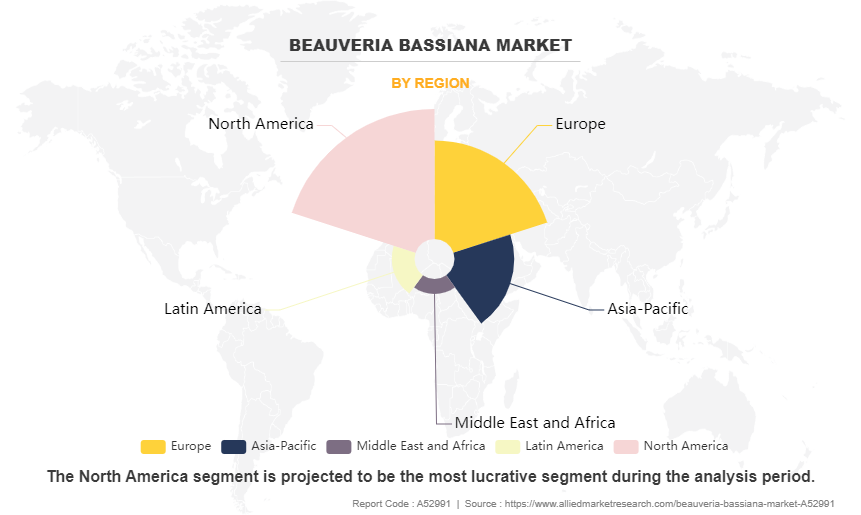
Competitive Analysis
The key players include BASF SE, Certis USA L.L.C., Filnova S.r.l., Tari- Biotech, T.Stanes and Company Limited, ARBICO Organics, Agrigem Ltd., Fargro Limited, Andermatt Group AG, and Novozymes A/S.
Several upcoming brands are vying for market dominance in the expanding beauveria bassiana industry. Smaller, niche firms are well-known for catering to consumer demands and tastes. An important competition component is innovation in beauveria bassiana products, ingredient sourcing, and sustainability policies.
Key Benefits for Stakeholders
- This report provides a quantitative analysis of the market segments, current trends, estimations, and dynamics of the beauveria bassiana market analysis from 2022 to 2032 to identify the prevailing beauveria bassiana market opportunities.
- The market research is offered along with information related to key drivers, restraints, and opportunities.
- Porter's five forces analysis highlights the potency of buyers and suppliers to enable stakeholders make profit-oriented business decisions and strengthen their supplier-buyer network.
- In-depth analysis of the beauveria bassiana market segmentation assists to determine the prevailing market opportunities.
- Major countries in each region are mapped according to their revenue contribution to the global market.
- Market player positioning facilitates benchmarking and provides a clear understanding of the present position of the market players.
- The report includes the analysis of the regional as well as global beauveria bassiana market trends, key players, market segments, application areas, and market growth strategies.
Beauveria Bassiana Market Report Highlights
| Aspects | Details |
| Forecast period | 2022 - 2032 |
| Report Pages | 251 |
| By Type |
|
| By Application |
|
| By Distribution Channel |
|
| By Region |
|
| Key Market Players | BASF SE, Agrigem Ltd., Novozymes A/S., Certis USA L.L.C., Filnova S.r.l., ARBICO Organics, Andermatt Group AG, Tari- Biotech, Fargro Limited, T.Stanes and Company Limited |
Analyst Review
As per the perspective of top-level CXOs, the global beauveria bassiana market is expected to offer attractive business opportunities in developing economies. The beauveria bassiana market is expected to grow at the highest rate, owing to increase in adoption, specifically in emerging countries, such as China, India, Japan, and Korea. Moreover, the production cost of beauveria bassiana is relatively low in Asia-Pacific as compared to other regions.
According to the CXOs, there are several advantages that boost the growth of the global beauveria bassiana market during the forecast period owing to its properties such as reduced environmental damage, targeted action, the necessity for smaller amounts for effective coverage, and quicker decomposition. Furthermore, the popularity of biopesticides as a whole has increased substantially in recent years, owing to extensive research in the beauveria bassiana market. In addition, the techniques for mass production, storage, transport, and application of beauveria bassiana have improved in recent years and are anticipated to provide lucrative opportunities in the future.
In addition, CXOs have stated that a recent trend that has gained traction in the global beauveria bassiana market is the growth in public concern over the potential health hazards of synthetic pesticides and the steep increase in the cost of cultivation leading to the exploration of eco-friendly pest management tactics that includes Integrated Pest Management (IPM).?Thus, the market seems to be expanding and is expected to experience rapid growth in the coming years.
The global beauveria bassiana market size was valued at USD 89.2 million in 2022, and is projected to reach USD 195.1 million by 2032.
The global beauveria bassiana market is projected to grow at a compound annual growth rate of 8.4% from 2023-2032 to reach USD 195.1 million by 2032.
The key players profiled in the reports includes BASF SE, Certis USA L.L.C., Filnova S.r.l., Tari- Biotech, T.Stanes and Company Limited, ARBICO Organics, Agrigem Ltd., Fargro Limited, Andermatt Group AG, and Novozymes A/S.
North America dominated in 2022 and is projected to maintain its leading position throughout the forecast period.
Shift Toward Non-Chemical Pest Control, Regulatory Pressures and Government Initiatives, Resistance to Chemical Pesticides, Horticulture and Floriculture Industry Expansion, Technological Advancements in Production and Formulation, Consumer Demand for Sustainable and Eco-Friendly Products majorly contribute toward the growth of the market.
Loading Table Of Content...
Loading Research Methodology...



